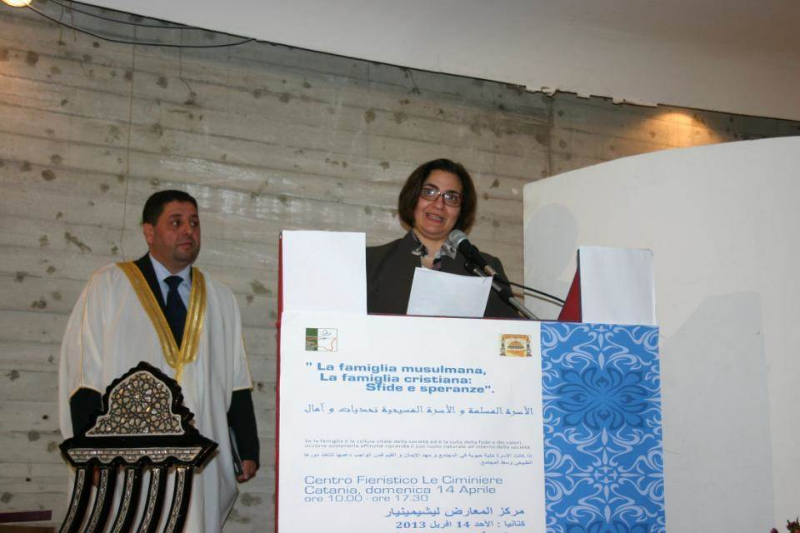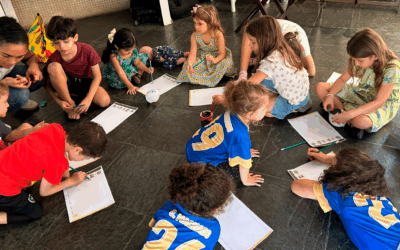 “Above all its a tale of friendship”. These words opened the meeting jointly organised by the Muslim community in Sicily and the Focolare Movement at Catania on the 14th April. “Some of the Focolare Movement members had met the Imam of Catania, and their friendship grew to include other Muslims and members of the movement, especially families. There were moments of sharing together the values of universal brotherhood through concretely lived experiences.” This was shared by Giusy Brogna of the Focolare, an expert in interfaith dialogue with Islam after having lived for years in the Middle East, who had organised the event together with journalist Roberto Mazzarella, Kheit Abdelhafid, Imam and President of the Muslim community in Sicily, and Vice President Ismail Bouchnafa. Nearly 500 people attended the event: it included entire families coming from various cities of Sicily, wherein a bond of friendship has already been built between the Focolare Movement’s local community and some Muslim families.
“Above all its a tale of friendship”. These words opened the meeting jointly organised by the Muslim community in Sicily and the Focolare Movement at Catania on the 14th April. “Some of the Focolare Movement members had met the Imam of Catania, and their friendship grew to include other Muslims and members of the movement, especially families. There were moments of sharing together the values of universal brotherhood through concretely lived experiences.” This was shared by Giusy Brogna of the Focolare, an expert in interfaith dialogue with Islam after having lived for years in the Middle East, who had organised the event together with journalist Roberto Mazzarella, Kheit Abdelhafid, Imam and President of the Muslim community in Sicily, and Vice President Ismail Bouchnafa. Nearly 500 people attended the event: it included entire families coming from various cities of Sicily, wherein a bond of friendship has already been built between the Focolare Movement’s local community and some Muslim families.  The Christian vision of the family and the enrichment brought by the Muslim family in the Italian society were among the main speeches, respectively presented by the couple Gaetano and Grazia Maria Amore, and Imam Kheit Abdelhafid. The latter voiced his satisfaction with the event as well as the long preparatory work involved. The family is a central reality in both our religious traditions, especially with regard to the future of our children, whom we would like to live in a world without barriers, which considers diversity as an enrichment”. The lived experiences confirmed what was spoken: they were shared by a family from Scicli; Giosi and Zanja, school mates from Ispica; Fatima and Hamed from Rosolini with their daughter Rabia and some Catholic friends. Among them were people who have been hosting education programmes for immigrant women in their parish premises since years. The afternoon programme was conducted by the youth. Christian and Muslim youth had shot a short movie in the earlier weeks to depict with irony, the common prejudices encountered when one does not know the different cultural and religious traditions.
The Christian vision of the family and the enrichment brought by the Muslim family in the Italian society were among the main speeches, respectively presented by the couple Gaetano and Grazia Maria Amore, and Imam Kheit Abdelhafid. The latter voiced his satisfaction with the event as well as the long preparatory work involved. The family is a central reality in both our religious traditions, especially with regard to the future of our children, whom we would like to live in a world without barriers, which considers diversity as an enrichment”. The lived experiences confirmed what was spoken: they were shared by a family from Scicli; Giosi and Zanja, school mates from Ispica; Fatima and Hamed from Rosolini with their daughter Rabia and some Catholic friends. Among them were people who have been hosting education programmes for immigrant women in their parish premises since years. The afternoon programme was conducted by the youth. Christian and Muslim youth had shot a short movie in the earlier weeks to depict with irony, the common prejudices encountered when one does not know the different cultural and religious traditions.  The archbishop of Catania, H.E. Monsignor Salvatore Gristina, who was present at the event, encouraged the organisers to continue on this endeavour. He said, “Let’s trust in God’s help. Let’s hold hands and go ahead.” Among the public figures who spoke, there was also the mayor of Catania, Raffaele Stancanelli, who thanked the organisers for having chosen his city to host this important event that is “capable of positively influencing our national community”. The 14th April event at Catania forms part of the experiences of fraternity promoted since a while between some Muslim communities and the Focolare, as part of the Progetto Italia (Italy Project), and which figured significantly last November at the event at Brescia.
The archbishop of Catania, H.E. Monsignor Salvatore Gristina, who was present at the event, encouraged the organisers to continue on this endeavour. He said, “Let’s trust in God’s help. Let’s hold hands and go ahead.” Among the public figures who spoke, there was also the mayor of Catania, Raffaele Stancanelli, who thanked the organisers for having chosen his city to host this important event that is “capable of positively influencing our national community”. The 14th April event at Catania forms part of the experiences of fraternity promoted since a while between some Muslim communities and the Focolare, as part of the Progetto Italia (Italy Project), and which figured significantly last November at the event at Brescia.
Spread real love everywhere
Spread real love everywhere




0 Comments